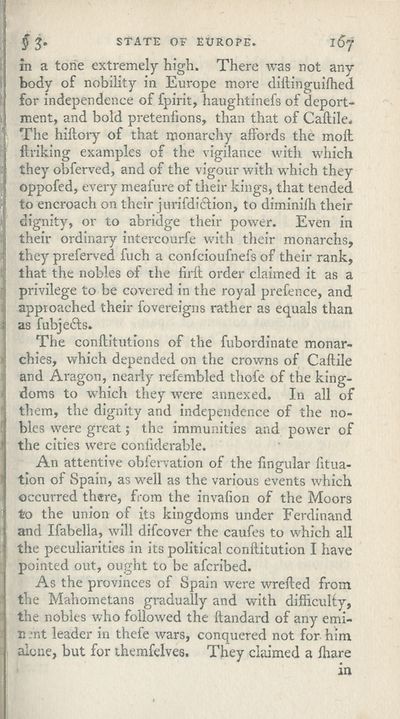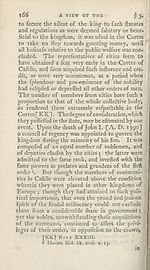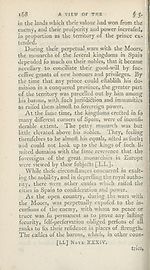Download files
Complete book:
Individual page:
Thumbnail gallery: Grid view | List view

§ J. STATE OF EUROPE. 167
in a tone extremely high. There was not any
body of nobility in Europe more diitinguifhed
for independence of fpirit, haughtinefs of deport¬
ment, and bold pretentions, than that of Caftile.
The hittory of that monarchy affords the motl
ftriking examples of the vigilance with which
they obferved, and of the vigour with which they
oppofed, every meafure of their kings, that tended
to encroach on their jurifdiction, to diminith their
dignity, or to abridge their power. Even in
their ordinary intercourfe with their monarchs,
they preferved fuch a confcioufnefs of their rank,
that the nobles of the firff order claimed it as a
privilege to be covered in the royal prefence, and
approached their fovereigns rather as equals than
as fubjefts.
The conftitutions of the fubordinate monar¬
chies, which depended on the crowns of Caftile
and Aragon, nearly refembled thofe of the king¬
doms to which they were annexed. In all of
them, the dignity and independence of the no¬
bles were great; the immunities and power of
the cities were confrderable.
An attentive obfervation of the Angular iitua-
tion of Spain, as well as the various events which
occurred there, from the invafion of the Moors
to the union of its kingdoms under Ferdinand
and Ifabella, will difcover the caufes to which all
the peculiarities in its political conftitution I have
pointed out, ought to be afcribed.
As the provinces of Spain were wrefted from
the Mahometans gradually and with difficulty,
the nobles who followed the ftandard of any emi-
n nt leader in thefe wars, conquered not for him
alone, but for themfelves. They claimed a ffiare
in
in a tone extremely high. There was not any
body of nobility in Europe more diitinguifhed
for independence of fpirit, haughtinefs of deport¬
ment, and bold pretentions, than that of Caftile.
The hittory of that monarchy affords the motl
ftriking examples of the vigilance with which
they obferved, and of the vigour with which they
oppofed, every meafure of their kings, that tended
to encroach on their jurifdiction, to diminith their
dignity, or to abridge their power. Even in
their ordinary intercourfe with their monarchs,
they preferved fuch a confcioufnefs of their rank,
that the nobles of the firff order claimed it as a
privilege to be covered in the royal prefence, and
approached their fovereigns rather as equals than
as fubjefts.
The conftitutions of the fubordinate monar¬
chies, which depended on the crowns of Caftile
and Aragon, nearly refembled thofe of the king¬
doms to which they were annexed. In all of
them, the dignity and independence of the no¬
bles were great; the immunities and power of
the cities were confrderable.
An attentive obfervation of the Angular iitua-
tion of Spain, as well as the various events which
occurred there, from the invafion of the Moors
to the union of its kingdoms under Ferdinand
and Ifabella, will difcover the caufes to which all
the peculiarities in its political conftitution I have
pointed out, ought to be afcribed.
As the provinces of Spain were wrefted from
the Mahometans gradually and with difficulty,
the nobles who followed the ftandard of any emi-
n nt leader in thefe wars, conquered not for him
alone, but for themfelves. They claimed a ffiare
in
Set display mode to:
![]() Universal Viewer |
Universal Viewer | ![]() Mirador |
Large image | Transcription
Mirador |
Large image | Transcription
| Antiquarian books of Scotland > Kings & rulers > History of the reign of the Emperor Charles V. > Volume 1 > (185) |
|---|
| Permanent URL | https://digital.nls.uk/109184551 |
|---|
| Description | By William Robertson. London : Cadell and Davies, 1798. |
|---|---|
| Shelfmark | ABS.1.76.13 |
| Additional NLS resources: | |
| Description | Thousands of printed books from the Antiquarian Books of Scotland collection which dates from 1641 to the 1980s. The collection consists of 14,800 books which were published in Scotland or have a Scottish connection, e.g. through the author, printer or owner. Subjects covered include sport, education, diseases, adventure, occupations, Jacobites, politics and religion. Among the 29 languages represented are English, Gaelic, Italian, French, Russian and Swedish. |
|---|

